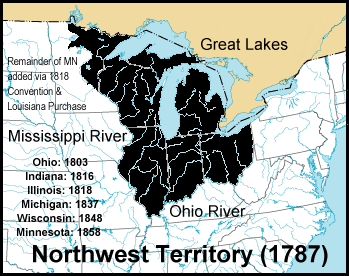The Northwest Ordinance of 1787 was signed on July 13, 1787.
On July 13, 1787, Congress passed the Northwest Ordinance—an act that established a framework for governing the Northwest Territory, admitting new states, and protecting the civil liberties of settlers. It also banned slavery in the new territories. However, it granted slaveholders the power to recapture enslaved people alleged to have escaped into them. When crafting the Northwest Ordinance, Congress drew, in part, on the work of Thomas Jefferson from his time in Congress. The Northwest Territory covered a massive tract of land that would eventually become the states of Illinois, Indiana, Michigan, Ohio, Wisconsin, and a section of Minnesota. Following the Civil War, Reconstruction Republicans drew on the Northwest Ordinance’s text to craft the Thirteenth Amendment, which abolished slavery.

Art. 1. No person, demeaning himself in a peaceable and orderly manner, shall ever be molested on account of his mode of worship or religious sentiments, in the said territory.
Art. 2. The inhabitants of the said territory shall always be entitled to the benefits of the writ of habeas corpus, and of the trial by jury; of a proportionate representation of the people in the legislature; and of judicial proceedings according to the course of the common law. All persons shall be bailable, unless for capital offenses, where the proof shall be evident or the presumption great. All fines shall be moderate; and no cruel or unusual punishments shall be inflicted. No man shall be deprived of his liberty or property, but by the judgment of his peers or the law of the land; and, should the public exigencies make it necessary, for the common preservation, to take any person’s property, or to demand his particular services, full compensation shall be made for the same. And, in the just preservation of rights and property, it is understood and declared, that no law ought ever to be made, or have force in the said territory, that shall, in any manner whatever, interfere with or affect private contracts or engagements, bona fide, and without fraud, previously formed.
Art. 3. Religion, morality, and knowledge, being necessary to good government and the happiness of mankind, schools and the means of education shall forever be encouraged. The utmost good faith shall always be observed towards the Indians; their lands and property shall never be taken from them without their consent; and, in their property, rights, and liberty, they shall never be invaded or disturbed, unless in just and lawful wars authorized by Congress; but laws founded in justice and humanity, shall from time to time be made for preventing wrongs being done to them, and for preserving peace and friendship with them.
. . .
Art. 6. There shall be neither slavery nor involuntary servitude in the said territory, otherwise than in the punishment of crimes whereof the party shall have been duly convicted: Provided, always, That any person escaping into the same, from whom labor or service is lawfully claimed in any one of the original States, such fugitive may be lawfully reclaimed and conveyed to the person claiming his or her labor or service as aforesaid.
Get a free copy of our free Pocket Constitution.
For more than 40 years, TheCapitol.Net and its predecessor, Congressional Quarterly Executive Conferences, have been teaching professionals from government, military, business, and NGOs about the dynamics and operations of the legislative and executive branches and how to work with them.
Our custom on-site and online training, publications, and audio courses include congressional operations, legislative and budget process, communication and advocacy, media and public relations, testifying before Congress, research skills, legislative drafting, critical thinking and writing, and more.
TheCapitol.Net is on the GSA Schedule, MAS, for custom on-site and online training. GSA Contract GS02F0192X
TheCapitol.Net is now owned by the Sunwater Institute.
Teaching how Washington and Congress work ™

